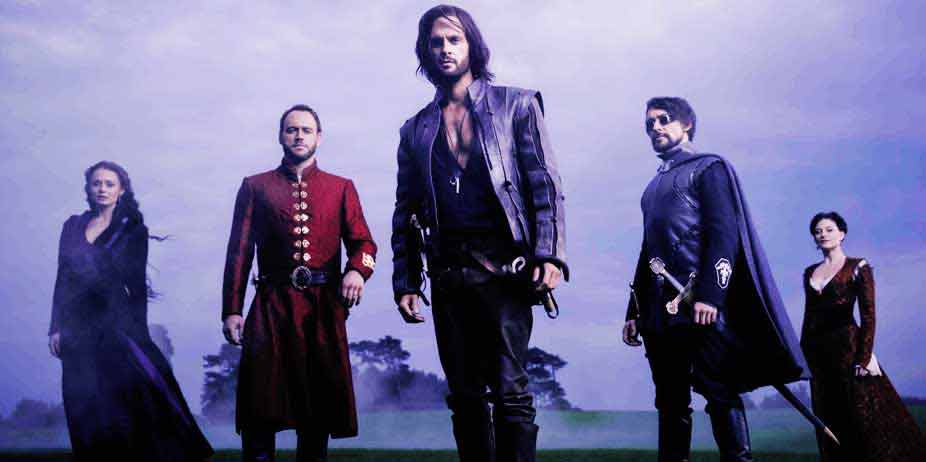 Da
Vinci's Demons, Season One (2013)
Da
Vinci's Demons, Season One (2013)
I love "visionary" television that blends history with fantastical elements. I love it even more if it has good writing, an excellent plot, visualization of a character's mental thought process, and excellent costume design. Unfortunately, along with mentally stimulating premises and a great deal of intrigue comes unnecessary amounts of nudity and sexual content that have little to do with the plot.
Leonardo Da Vinci (Tom RIley) is a man of vision who is constantly inventing, tinkering with new concepts, and famous for his extraordinary concepts. He is both lazy in terms of finishing the things that do not hold his interest (namely, paid commissions) and ambitious in his desire to attract the attention of the patron of Florence, Lorenzo Medici (Elliot Cowan). He is particularly intrigued with the beauty of Medici's mistress, the secretive Lucrezia (Laura Haddock), whom no one knows has a double life as an informer to Rome. There is a rivalry between the Medicis and the Pope, with both sides seeking advantageous positions in the event of war. Leonardo's inventions help Florence in this regard, but he also becomes obsessed with unraveling a mystery that connects to his mother's many year before disappearance.
A mysterious key and the map that it will reveal if it falls into the right hands also draws the attention of the fiercely intelligent and utterly ruthless Riario (Blake Ritson), who will stop at nothing in his attempts to reap the undiscovered treasure it promises them. Meanwhile, the lives of other characters in Leonardo's life play out, entangling him in affairs both personal and political. The premise behind all of this is intensely clever and it benefits from strong writing and a sense of energetic purpose throughout. Though the characters are not always likable, they are interesting and the stakes heighten with each episode until they end on a brutal, frightening note in the season finale. It is as much re-imagined history as it is influenced by supernatural themes of mysticism, prophetic dreams, and realities beyond the obvious. This is most apparent in one episode, when Leonardo and his friends encounter Vlad Tepes, the ruthless warlord whose bloodlust inspired the legend of Count Dracula. He professes to have sold his soul in exchange for immortality, and although we never find out what happens to him, there is a strong undercurrent of supernatural ability in his actions.
Few films and series play out during this period, which has ties to the Borgia reign and also unfolding events in Spain; Queen Isabella and King Ferdinand make a brief appearance, to consider consolidating ties with Florence and subsequently, give us a glimpse into the politics beyond these borders. In truth, it hooked me almost from the first and carried that obsession throughout, although I also felt intense repugnance at times for the content. It feels like for no other reason than ensuring that cable providers get their pornographic quota, the plot engages in needless nudity that distracts from key scenes. In fact, entire sequences play out that include nudity that have no bearing on the plot, and one cannot skip any of these scenes because they contain vital pieces of information. I spent a lot of time staring at the ceiling. The show, as a result, prefers to titillate and give in to carnality when it could entice, and become a truly brilliant piece of television.
Beyond that, everything about it is first class, from a wonderful cast to exquisite costume design. The music is wonderful and evocative both of the period and the scenes it underscores. Leonardo is a fascinating man in his own right, and this series devotes time to exploring his inventions and his artwork, as well as his personal interests and beliefs. It's a unique concept and when it focuses more on plot than flesh, it is done very well.
Sexual Content:
Many scenes of graphic sexual content and nudity involving both
genders; sometimes, characters spend entire speaking scenes
fully naked from the front. References to homosexuality and
homoeroticism; the Pope is portrayed as being turned on by
sexual violence. One particularly unpleasant episode involves
Leonardo going on trial for homosexuality (he shares a kiss with
another man) and getting out of it by implicating the judge in a
bestiality case. Naked corpses are dissected. A bawdy play is
put on for the amusement of visiting dignitaries.
Language:
Many uses of the f-word, some abuses of deity, crude references
to genitalia, and profanities.
Violence:
Infrequent but often gory, with bloody results, corpses, slit
throats, stabbings, bludgeoning, and drowning. People are
tortured for information by having their fingers crushed and
their eyes threatened to be put out.
Other:
Prophetic dreams, conversations about exchanging one's soul for
supernatural powers, and a heavy theme of mysticism run
throughout.
